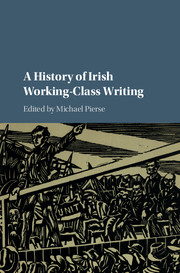Book contents
- A History of Irish Working-Class Writing
- A History of Irish Working-Class Writing
- Copyright page
- Dedication
- Contents
- Contributors
- Foreword
- Acknowledgements
- Introduction
- Chapter 1 Writing and Theorising the Irish Working Class
- Chapter 2 Representing Labour
- Chapter 3 Working-Class Writing in Ireland before 1800
- Chapter 4 ‘We wove our ain wab’
- Chapter 5 Sub-literatures?
- Chapter 6 Writing Working-Class Irish Women
- Chapter 7 ‘Unwriting’ the City
- Chapter 8 Class during the Irish Revolution
- Chapter 9 ‘An sinne a bhí sa chónra?’*
- Chapter 10 Writing Irish Nurses in Britain
- Chapter 11 The View from Below
- Chapter 12 Irish Working-Class Writing in Australasia, 1860–1960
- Chapter 13 Irish Working-Class Poetry 1900–1960
- Chapter 14 ‘A system that inflicts suffering upon the many’
- Chapter 15 Drama, 1900–1950
- Chapter 16 Seán O’Casey and Brendan Behan
- Chapter 17 Reshaping Well-Worn Genres
- Chapter 18 Locked Out
- Chapter 19 Poetry and the Working Class in Northern Ireland during the Troubles
- Chapter 20 Class Politics and Performance in Troubles Drama
- Chapter 21 Twentieth-Century Workers’ Biography*
- Chapter 22 Multiple Class Consciousnesses in Writings for Theatre during the Celtic Tiger Era
- Afterword
- Bibliography
- Index
- References
Bibliography
Published online by Cambridge University Press: 10 November 2017
- A History of Irish Working-Class Writing
- A History of Irish Working-Class Writing
- Copyright page
- Dedication
- Contents
- Contributors
- Foreword
- Acknowledgements
- Introduction
- Chapter 1 Writing and Theorising the Irish Working Class
- Chapter 2 Representing Labour
- Chapter 3 Working-Class Writing in Ireland before 1800
- Chapter 4 ‘We wove our ain wab’
- Chapter 5 Sub-literatures?
- Chapter 6 Writing Working-Class Irish Women
- Chapter 7 ‘Unwriting’ the City
- Chapter 8 Class during the Irish Revolution
- Chapter 9 ‘An sinne a bhí sa chónra?’*
- Chapter 10 Writing Irish Nurses in Britain
- Chapter 11 The View from Below
- Chapter 12 Irish Working-Class Writing in Australasia, 1860–1960
- Chapter 13 Irish Working-Class Poetry 1900–1960
- Chapter 14 ‘A system that inflicts suffering upon the many’
- Chapter 15 Drama, 1900–1950
- Chapter 16 Seán O’Casey and Brendan Behan
- Chapter 17 Reshaping Well-Worn Genres
- Chapter 18 Locked Out
- Chapter 19 Poetry and the Working Class in Northern Ireland during the Troubles
- Chapter 20 Class Politics and Performance in Troubles Drama
- Chapter 21 Twentieth-Century Workers’ Biography*
- Chapter 22 Multiple Class Consciousnesses in Writings for Theatre during the Celtic Tiger Era
- Afterword
- Bibliography
- Index
- References
- Type
- Chapter
- Information
- A History of Irish Working-Class Writing , pp. 407 - 442Publisher: Cambridge University PressPrint publication year: 2017

